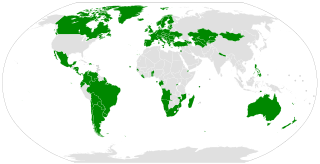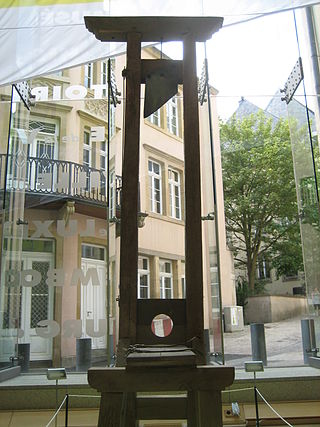Related Research Articles
Capital punishment, also known as the death penalty and formerly called judicial homicide, is the state-sanctioned killing of a person as punishment for actual or supposed misconduct. The sentence ordering that an offender be punished in such a manner is known as a death sentence, and the act of carrying out the sentence is known as an execution. A prisoner who has been sentenced to death and awaits execution is condemned and is commonly referred to as being "on death row". Etymologically, the term capital refers to execution by beheading, but executions are carried out by many methods, including hanging, shooting, lethal injection, stoning, electrocution, and gassing.

Capital punishment has been completely abolished in all European countries except for Belarus and Russia, the latter of which has a moratorium and has not carried out an execution since September 1996. The complete ban on capital punishment is enshrined in both the Charter of Fundamental Rights of the European Union (EU) and two widely adopted protocols of the European Convention on Human Rights of the Council of Europe, and is thus considered a central value. Of all modern European countries, San Marino, Portugal, and the Netherlands were the first to abolish capital punishment, whereas only Belarus still practises capital punishment in some form or another. In 2012, Latvia became the last EU member state to abolish capital punishment in wartime.
Capital punishment for murder was abolished in Malta in 1971. However, the death penalty continued to be part of the country's military code until it was fully abolished on 21 March 2000. Malta is a signatory of the Second Optional Protocol to the International Covenant on Civil and Political Rights that commits it to abolition of the death penalty within its borders. Malta has also ratified protocol 13 to the European Convention on Human Rights, that bans the death penalty in all circumstances.

Capital punishment in modern Greece was carried out using the guillotine or by firing squad. It was last applied in 1972 during the military junta. The death penalty was abolished in stages between 1975 and 2005.

Capital punishment in Latvia was abolished for ordinary crimes in 1999 and for crimes committed during wartime in 2012. Latvia is party to several international instruments which ban capital punishment.

The Second Optional Protocol to the International Covenant on Civil and Political Rights, aiming at the abolition of the death penalty, is a subsidiary agreement to the International Covenant on Civil and Political Rights. It was created on 15 December 1989 and entered into force on 11 July 1991. As of December 2024, the Optional Protocol has 92 state parties. The most recent country to ratify was Zambia, on 19 December 2024.
Capital punishment in Tajikistan is allowed by Article 18 of the 1999 Constitution of Tajikistan, which provides:
"Every person has the right to life. No person may be deprived of life except by the verdict of a court for a very serious crime."
Capital punishment in Kazakhstan was abolished for all crimes in 2021. Until 2021, it had been abolished for ordinary crimes but was still permitted for crimes occurring in special circumstances. The legal method of execution in Kazakhstan had been shooting, specifically a single shot to the back of the head.

Capital punishment in Luxembourg was abolished for all crimes in 1979.
Capital punishment has been abolished in Seychelles. The country permanently abolished the death penalty by a Constitutional amendment in June 1993.
Capital punishment in Angola was abolished by constitution in 1992. In 1977, the country carried out its last executions, which were of Nito Alves and many of his supporters, who were convicted of treason. The execution method in Angola was by firing squad. Angola signed the Second Optional Protocol to the International Covenant on Civil and Political Rights on September 24, 2013, and ratified it on October 2, 2019. Angola voted in favor of the UN moratorium on the death penalty in 2007, 2008, 2010, 2012, 2014, 2016, 2018, and most recently in 2020.
Capital punishment in Chile is legally sanctioned, albeit with significant limitations. Since its abolition for civilian offenses in 2001, its application has been restricted to military personnel convicted of war crimes and crimes against humanity committed during wartime. This places Chile among the seven countries globally that have abolished capital punishment solely for ordinary crimes.
Capital punishment in Burkina Faso has been abolished. In late May 2018, the National Assembly of Burkina Faso adopted a new penal code that omitted the death penalty as a sentencing option, thereby abolishing the death penalty for all crimes.

Capital punishment is abolished in Argentina and is no longer a lawful punishment in the country. Argentina abolished capital punishment for ordinary crimes in 1984 and abolished it for all crimes in 2008, supported by the president at the time, Cristina Fernández de Kirchner. Argentina voted in favor of the United Nations moratorium on the death penalty eight times, in 2007, 2008, 2010, 2012, 2014, 2016, 2018, and 2020. Argentina signed the Second Optional Protocol to the International Covenant on Civil and Political Rights on 20 Dec 2006 and ratified it on 2 Sep 2008.
Capital punishment has been abolished in Bolivia and is no longer a lawful punishment in the country. It was abolished for ordinary crimes in 1997, and for all crimes in 2009. Bolivia's last execution was of Melquiades Suxo on 30 August 1973.
Capital punishment in Gabon was officially abolished for all crimes in 2010. Gabon's last execution took place in 1985. Prior to abolition, Gabon was classified as de facto abolitionist, or "abolitionist in practice," due to the length of time since their last execution.
Capital punishment was abolished in Guinea. The civilian death penalty was abolished in 2016. It was abolished under military law in 2017. Guinea carried out its last execution in 2001. Prior to its abolition for ordinary crimes in 2016, Guinea was classified as retentionist.
Capital punishment was abolished in Guinea-Bissau in 1993. The country carried out its last execution in 1986. In February 1993, the National People's Assembly (Guinea-Bissau) passed an amendment to the constitution which abolished the death penalty for aggravated murder and treason.
Capital punishment was abolished in Madagascar in 2015. The last execution in Madagascar was carried out in 1958. Prior to de jure abolition, Madagascar was classified as "Abolitionist in Practice."
Ethiopia retains capital punishment while not ratified the Second Optional Protocol (ICCR) of UN General Assembly resolution. Historically, capital punishments was codified under Fetha Negest in order to fulfill societal desire. Death penalty can be applied through approval of the President, but executions are rare.
References
- ↑ Death Penalty Archived August 23, 2011, at the Wayback Machine , Belgorod State University
- ↑ "The end of capital punishment in Europe", Capital Punishment UK
- ↑ "1865. San Marino decide la completa abolizione della pena di morte". sanmarinortv.sm (in Italian). 10 October 2010. Retrieved 28 May 2021.
- ↑ "Death Penalty Statistics 2006", Amnesty International
- ↑ Determinants of the death penalty: a comparative study of the world, Carsten Anckar, Routledge, 2004, ISBN 0-415-33398-9, p.17
- ↑ Death Penalty: Beyond Abolition, Council of Europe, 2004, ISBN 92-871-5332-9, p.32
- ↑ "THE DEATH PENALTY: ABOLITION GAINS GROUND" Archived March 7, 2010, at the Wayback Machine , Martine Jacot, UNESCO Courier, October 1999
- ↑ "The end of capital punishment in Europe", Capital Punishment UK
- ↑ "Chart of signatures and ratifications of Treaty 187". coe.int. Retrieved 22 July 2022.
- ↑ "12. Second Optional Protocol to the International Covenant on Civil and Political Rights, aiming at the abolition of the death penalty". un.org. Retrieved 22 July 2022.
